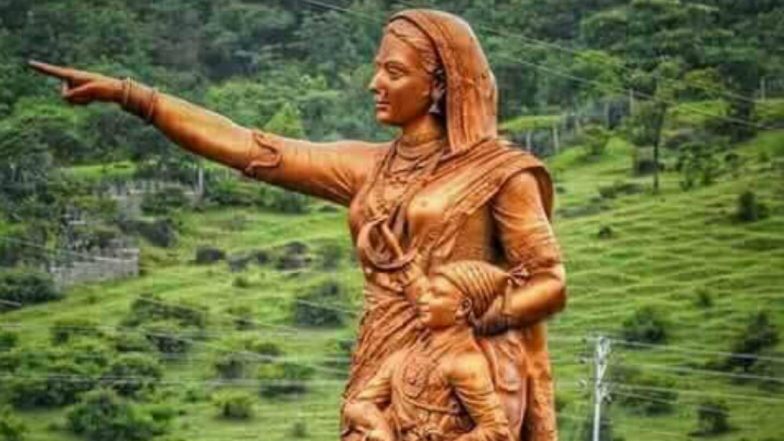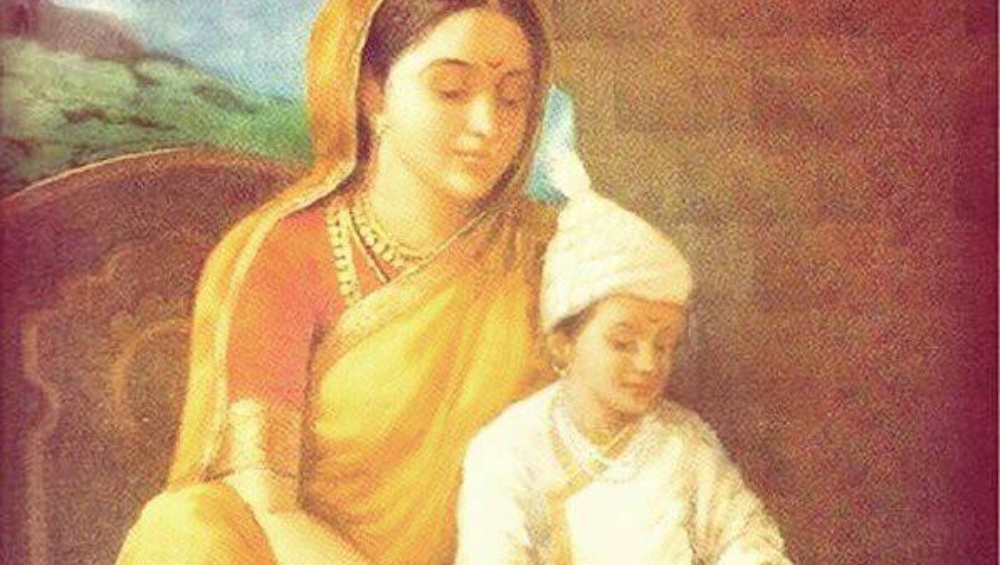In the annals of Indian history, the saga of Jijamata Bhonsle, often referred to as Rajmata and Rastramata, stands as a testament to the strength, resilience, and indomitable spirit of a mother who played a pivotal role in shaping the destiny of one of the most formidable empires – the Maratha Empire.
 Born on January 12, 1598, to Mhalasabai and Lakhuji Jadhav in Sindkhed Raja, Jijamata belonged to a lineage claiming descent from the illustrious Yadav. At an early age, she was married to Shahaji Bhonsle Maharaj, the son of Maloji Bhonsle Maharaj, a valiant military commander in the service of the Nizam.
Born on January 12, 1598, to Mhalasabai and Lakhuji Jadhav in Sindkhed Raja, Jijamata belonged to a lineage claiming descent from the illustrious Yadav. At an early age, she was married to Shahaji Bhonsle Maharaj, the son of Maloji Bhonsle Maharaj, a valiant military commander in the service of the Nizam.
The pages of history turned dramatically when Jijamata gave birth to Shivaji later to be called as Chhatrapati Shivaji Maharaj her second son, in February 1630. Sambhaji, her elder son, had tragically perished in a war. In remembrance, Shivaji named his firstborn Sambhaji Raje.
When Chhatrapati Shivaji Maharaj was merely 14, Shahaji Raje handed over the Jagir of Pune to him, thrusting the responsibility of its management upon Jijamata. The socio-political landscape was turbulent, besieged by Nizamshah, Adilshah, and Mughals. In the face of adversity, Jijamata demonstrated exceptional fortitude.
Arriving in Pune with Shivaji, Jijamata faced the daunting task of reviving a city under constant threat. With resilience akin to her golden plow that tilled the farmland, she transformed Pune’s fate. Jijamata provided sanctuary to the locals, creating an environment conducive to growth.
Beyond her administrative prowess, Jijamata played a crucial role in Shivaji’s education. Narrating tales from the Ramayana and the Mahabharata, she instilled values of independence and righteousness in her son. Her guidance became the moral compass for the future Maratha ruler.
Jijamata’s influence extended to the spiritual realm. She established the Kasba Ganapati Mandir and undertook renovations of the Kevareshwar Temple and Tambadi Jogeshwari Temple, leaving an indelible mark on Pune’s cultural and religious landscape.
Lessons Taught to Chhatrapati Shivaji Maharaj: 
- Self-Governance (Swarajya): Jijamata instilled in Shivaji the concept of self-governance, described as Swarajya. This principle became the cornerstone of Shivaji’s leadership and vision for the Maratha Empire.
- Vigilance and Leadership: She emphasized the importance of vigilance and astute leadership. This lesson bore fruit during the confrontation with General Afzal Khan, where Shivaji’s vigilance and strategic acumen triumphed.
- Respect for Women: Jijamata ardently advocated for the respect and dignity of women. Shivaji, following her teachings, treated women with reverence, creating an environment where they were revered as goddesses.
- Diplomacy for Dharma: Jijamata imparted the significance of diplomatic strategies to uphold Dharma (righteousness). Shivaji’s success over the Mughals was attributed to his diplomatic prowess and fair governance.
Chhatrapati Shivaji Maharaj’s Greater Empire Compared to Mughals: His empire surpassed the Mughals in several aspects:

- Equitable Treatment of Farmers: Unlike the Mughals, who relied on farmers without fair compensation, the Chhatrapati Shivaji Maharaj army paid fees for seized food, ensuring equitable treatment.
- Respect for Women: In Shivaji’s realm, women were revered, challenging the Mughal norm. Muslim commanders were prominent in Shivaji’s army, reflecting inclusivity.
- Religious Inclusivity: Chhatrapati Shivaji Maharaj’s army comprised numerous Muslim commanders, showcasing religious inclusivity absent in the Mughal rule.
Jijamata Bhonsle’s legacy is not confined to her era; it echoes through Shivaji’s reign and beyond. Her teachings shaped a leader who surpassed their contemporaries, fostering an empire grounded in justice, inclusivity, and respect. As modern entrepreneurs navigate challenges, the timeless lessons from Jijamata’s legacy stand as beacons, emphasizing the transformative power of leadership rooted in values and service to others.




